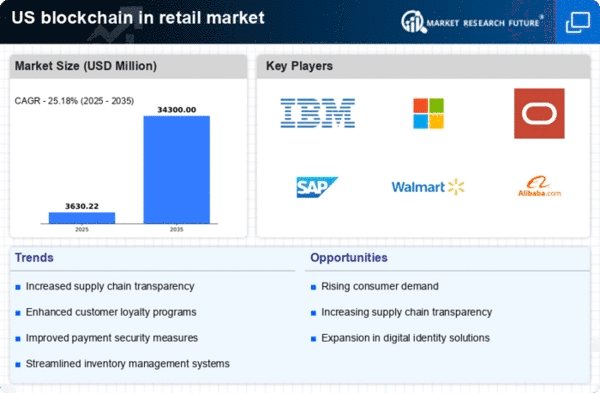Enhanced Data Security
Data security remains a paramount concern in the retail sector, and the blockchain in retail market addresses this issue effectively. By utilizing decentralized ledger technology, retailers can safeguard sensitive customer information and transaction data from potential breaches. The immutable nature of blockchain records ensures that once data is entered, it cannot be altered or deleted, thereby providing a robust defense against fraud and cyberattacks. As retailers increasingly face regulatory scrutiny regarding data protection, the implementation of blockchain solutions may help them comply with stringent regulations, potentially reducing the risk of costly fines. The market for blockchain-based security solutions is projected to grow significantly, indicating a strong demand for enhanced data protection in retail.
Improved Inventory Management
the blockchain in retail market is experiencing a transformation in inventory management practices. By leveraging blockchain technology, retailers can achieve real-time visibility into their inventory levels, which enhances accuracy and reduces the risk of stockouts or overstock situations. This technology allows for the tracking of products from the manufacturer to the consumer, ensuring that retailers have access to precise data regarding product availability. According to recent estimates, the adoption of blockchain solutions in inventory management could lead to a reduction in inventory holding costs by up to 30%. This efficiency not only improves operational performance but also enhances customer satisfaction, as consumers are more likely to find the products they seek in stock.
Increased Regulatory Compliance
the blockchain in retail market is also influenced by the growing need for regulatory compliance. Retailers are facing an increasingly complex landscape of regulations, particularly concerning consumer protection and data privacy. Blockchain technology offers a solution by providing a transparent and auditable record of transactions, which can simplify compliance with various regulations. This capability not only helps retailers avoid potential legal issues but also builds trust with consumers who are concerned about data security and ethical practices. As regulatory frameworks continue to evolve, the adoption of blockchain solutions may become essential for retailers aiming to maintain compliance and competitive advantage.
Sustainable Supply Chain Practices
Sustainability is becoming a critical focus in the retail sector, and the blockchain in retail market is facilitating this shift. By providing transparent tracking of products throughout the supply chain, blockchain technology enables retailers to verify the sustainability of their sourcing practices. This capability allows consumers to make informed choices about the products they purchase, fostering a more environmentally conscious shopping experience. Retailers that adopt blockchain solutions may also benefit from enhanced brand loyalty, as consumers increasingly prefer to support businesses that prioritize sustainability. The market for sustainable retail practices is expected to grow, with blockchain playing a pivotal role in this transformation.
Facilitated Cross-Border Transactions
the blockchain in retail market is poised to revolutionize cross-border transactions, which have traditionally been fraught with delays and high fees. By utilizing blockchain technology, retailers can streamline international payments, reducing transaction times from days to mere minutes. This efficiency is particularly beneficial for e-commerce businesses that operate on a global scale, as it allows them to offer competitive pricing and faster delivery options. Current estimates suggest that blockchain could reduce transaction costs by up to 40%, making it an attractive option for retailers looking to expand their international reach. As more retailers adopt blockchain for cross-border transactions, the market is likely to see increased growth and innovation.
















